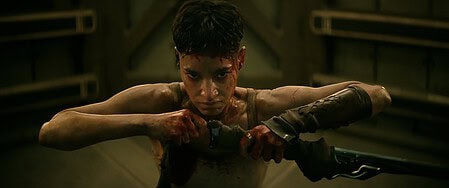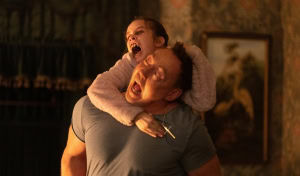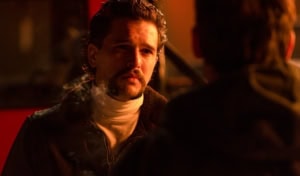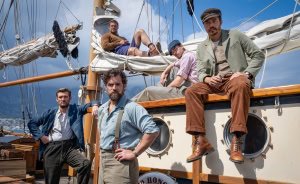In an era where more films are released than ever before, it’s rare to experience a story that is truly one of a kind. That is why Bloody Hell, a coming-of-age story starring Maddie Ziegler (The Fallout, West Side Story) and directed by Molly McGlynn, was such a breath of fresh air for this year’s SXSW audiences.
The film is one of the first, if not the first narrative feature to explore MRKH Syndrome, certainly in the form of a coming-of-age sex comedy. The rare reproductive disorder is found in women whose vagina and uterus are underdeveloped or even completely absent. In the film, Ziegler’s character, Lindy, learns that she has no uterus and a shortened vaginal canal on the cusp of her sexual development.
McGlynn was aware of the lack of precedent, taking it as an opportunity to both share her life story and simultaneously create a space for others to do the same. “You know, it’s not something I took lightly,” explained McGlynn, recouping from her “whirlwind” South By experience. “My experience with it is specific and it’s mine. I’m honored to be the first one, but I really hope I’m not the last because there is so much more to be said from other people who aren’t me.”
McGlynn, who also wrote the screenplay, was diagnosed with MRKH Syndrome when she was 16 years old. “It’s a lifelong relationship you have with this condition,” she continued. “It evolves over time. How it affects you at 16 is different than how it affects me now as a 37-year-old woman.”
On her journey, Lindy meets Jax, played by Ki Griffin, who identifies as intersex, meaning that their sexual anatomy does not fit the clean definitions of “male” or “female.” Lindy’s discovery that she might be intersex reflected McGlynn’s own realization while doing research for the film.
“I was blown away. Here I was, 30-something years old, and I did not know this. It kind of stopped me in my tracks. I was like, ‘Am I intersex? Who am I?’” McGlynn laughs as she recounts this.
Jax and Lindy’s relationship is central to the story, two people who do not identify the same yet are sharing an experience together. “Jax is full of joy and lightness and peace in their identity. That was a person I needed in my life. I think that character’s also a beacon of hope whether they’re intersex or not.”
It’s one of the many elements of Bloody Hell that feel fresh and insightful in a palpably exciting way. Audiences have been wowed by the film’s unabashed exploration of these topics, all of it wrapped within a hilarious, hopeful coming-of-age story. McGlynn recalls being “overwhelmed” when, following its premiere screening at the Stateside Theatre, the film was treated to a standing ovation.
“This film has been the culmination of over half my life,” she explains. “Premiering any film is nerve-wracking, but we got such an incredibly warm reception. It was a really beautiful night.”
Following its premiere, McGlynn spoke to Geek Vibes Nation about putting her life story on film, how she conceptualized the film’s colorful aesthetic, and what it meant to have Janelle Monáe join the film as an executive producer. Here is our conversation, edited for length and clarity.

How are you doing?
I am doing well. Just back in LA, recovering from a whirlwind.
Right, I can imagine. That goes perfectly into my first question for you. I can imagine that going to SXSW with this film was probably an incredible experience. Can you tell me a little bit about it?
This film has been the culmination of over half my life because it’s largely based on my life story. I’ve been developing it for a few years, so it felt like a really momentous occasion and we’re just so thrilled to have played SXSW. That was the festival we were targeting. We had a great premiere on Monday at the Stateside Theatre and had 300 strangers show up to see something that’s so personal. Premiering any film is nerve-wracking, but we got such an incredibly warm reception and a standing ovation that I did not anticipate at all. It was a really beautiful night but overwhelming.
I was lucky enough to attend that premiere!
Oh, great!
It was really a beautiful screening. Can you take me back to how you were feeling when the film ended? I looked over at where you and the cast were sitting and everybody was hugging each other. It was clearly a very emotional moment.
It was a little bit out-of-body, but I remember looking over at Maddie [Ziegler] and that just filled me with so much joy and pride. This film is based on my life story, but when you bring it to an actor, it also becomes their own as well. I really feel like it’s both Maddie’s and my story. I get goosebumps thinking about it. This is not an easy role. She was very brave and brought her whole self to it, and she’s so humble. To see people recognize her and her work was the most meaningful part of my night.
I love to hear that. It is exceptional work. I really did enjoy the film and as soon as I finished watching it, I had so many questions and I was really interested in diving into it.
Well, I’m glad you say that because this is a film that can maybe prompt more questions than answers that I have, and that’s kind of the point, you know?
Absolutely. During the Q&A you mentioned that this was the first film about MRKH Syndrome and that is a very palpable feeling while you’re watching it. It really does feel like we’re exploring a very new perception of not just teen comedies but the female experience on screen. What did it feel like to have worked on a film that is the first of its kind? Is there something freeing about it? Stressful about it?
You know, it’s not something I took lightly. The viewers whose opinions I’m most interested in are people with MRKH, of course. However, my experience with it is specific and it’s mine. I really made it clear to the MRKH community and people that I talk to that it’s impossible for me to encapsulate all of this. It’s a lifelong relationship you have with this condition. It evolves over time. How it affects you at 16 is different than how it affects me now as a 37-year-old woman. I’m honored to be the first one, but I really hope I’m not the last because there is so much more to be said from other people who aren’t me.
Seeing Janelle Monáe as an executive producer was such a joy. She is, in my view and I think many others’, one of the leading voices in discussions about sexual and gender fluidity. What was it like to have her involved in the project?
I am such a fan of Janelle’s work and respect the hell out of her and who she is as a person. When we had a rough cut of [Bloody Hell], my agent was like, “I think Janelle’s company Wondaland needs to see this film.” I think they were leaving TIFF after her Glass Onion premiere and the first round of people at Wondaland watched it. Then they got her an earlier flight home to LA to watch it in person with them.
Wow.
I was just so thrilled that they came on towards the end. I don’t want to speak for them, but I think they responded to the subject matter and the themes. We’ve got this beautiful, interesting, diverse cast and not just Maddie’s role but all the other characters as well have their own pull and connection to them. I’m still blown away and honored that they came onboard because having her name on this is like…Janelle gets it.
I have to imagine one particular element stuck out to her and that is the character of Jax and the intersex discussion that happens in the film. I felt like that character unlocks a new dimension to the story. How did you come to the decision that you wanted to incorporate Jax and the intersex community in this major way?
I’m so glad you asked that question. That character is not there because I think it’s a zeitgeisty role. I’m putting that character there because a few years ago, when I was writing the script, I did more research on the condition and discovered that MRKH largely falls under the intersex umbrella. I was blown away. Here I was, 30-something years old, and I did not know this. It kind of stopped me in my tracks. I was like, “Am I intersex? Who am I?”
Right!
Within the MRKH community, there is a lot of discussion around if it is [considered intersex] or if it isn’t. “Intersex” simply means non-normative reproductive parts. So, technically, it does fall under that. Some women with MRKH feel that they do not identify with the term “intersex.” Some do. If someone wants to say “I’m intersex,” or they want to say “I’m not,” none of those matter because I am both and I am neither. That’s why I can’t answer it that clearly. Jax is the personification of this discussion. Beyond being intersex, Jax is full of joy and lightness and peace in their identity. That was a person I needed in my life. I needed to see someone who was confident in their identity. I think that character’s also a beacon of hope whether they’re intersex or not.
It really does feel like you have two characters who may not necessarily identify the same in that discussion yet can both connect over a shared experience. It’s a corner of this movie that I really, really loved.
Thank you.
In an interview with Maddie, she spoke about how she got a look book from you, which is something that heavily inspired her decision to join the film. What does that look book look like? What were some of the visual inspirations for Bloody Hell?

It started with the picture of the “Birth of Venus,” that classic portrait of the female form, and with that Simone de Beauvoir quote, “The body is not a thing, it’s a situation.” From the get-go, I’m sort of deconstructing idealized forms of femininity. Then I included a lot of sexualized fruit and bright color palettes and made sure it was joyful. I had a page just called “Science Break” where I just explained the facts. I think it captures the film well in that it was informative, it represented the color and look of the film, and also the tongue-and-cheek tone.
I do love the colorful elements of the film. There is a moment at the beginning of the film and a moment at the end of the film that are mirrors of each other. Color plays a huge role in that. Can you talk to me a little about the choice to mirror both scenes and code them via the colors you chose?
Those two moments were scripted. From the beginning, I wanted to start with a teen fantasy of what sex is. The first shot of her is revealed to be a male point of view, juxtaposed with the last shot which is her own reflection. I wanted the first and last frame to show the entire character journey. Our cinematographer Nina [Djacic] comes from the music video world. We decided, from the get-go, to create this Gen Z, bright music video world that’s fantasy. It’s not real. Then, we cut out of the fantasy in a wide shot where she’s masturbating, it’s natural light, and it’s real life. We used the color to juxtapose fantasy and idealism with reality.
While I was watching the film, the word I kept coming back to was “microaggression.”
Yeah.
There are these little moments throughout the film where it’s shown how gendered our society is and how there’s so much of a male presence in so many of these women’s experiences. I mean, the line where we learn MRKH was literally named after the four men who invented it struck me like a wrecking ball. Were these moments something you were cognizant about while you were writing the script?
Oh, 100%. I was very much subtly trying to show the ever-pervasive weight of the patriarchy, both in women’s lives and the medical system. Even in the pharmacy in the beginning of the film, there’s a man who’s looking at them. Then the cashier is a man. Then there’s another man who comes behind her. It’s just this weird background beat, but she’s literally sandwiched between men. It’s this inescapable place she’s in.
Bloody Hell had its World Premiere in the Narrative Spotlight section of SXSW 2023. It is currently seeking U.S. distribution.

Larry Fried is a filmmaker, writer, and podcaster based in New Jersey. He is the host and creator of the podcast “My Favorite Movie is…,” a podcast dedicated to helping filmmakers make somebody’s next favorite movie. He is also the Visual Content Manager for Special Olympics New Jersey, an organization dedicated to competition and training opportunities for athletes with intellectual disabilities across the Garden State.







